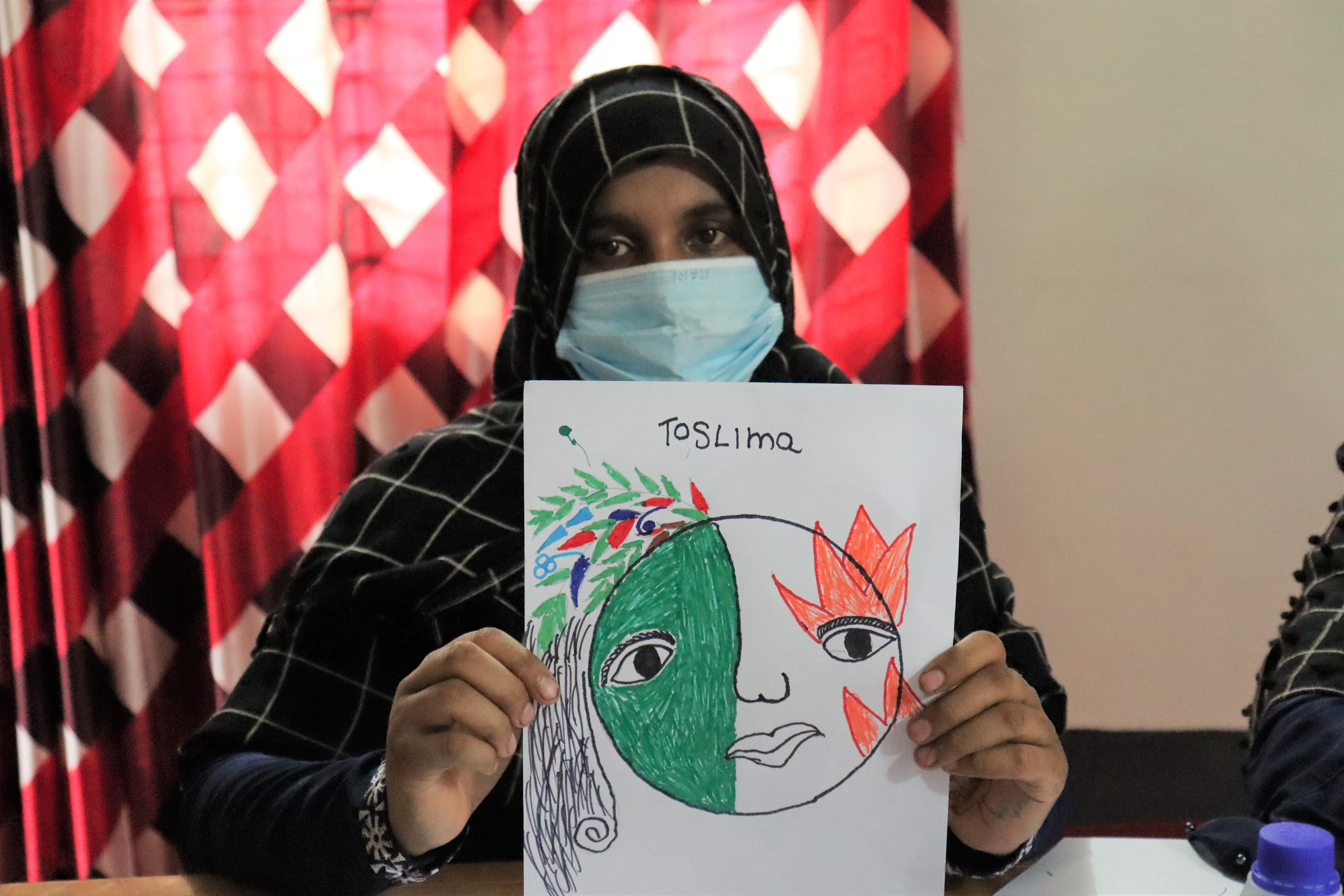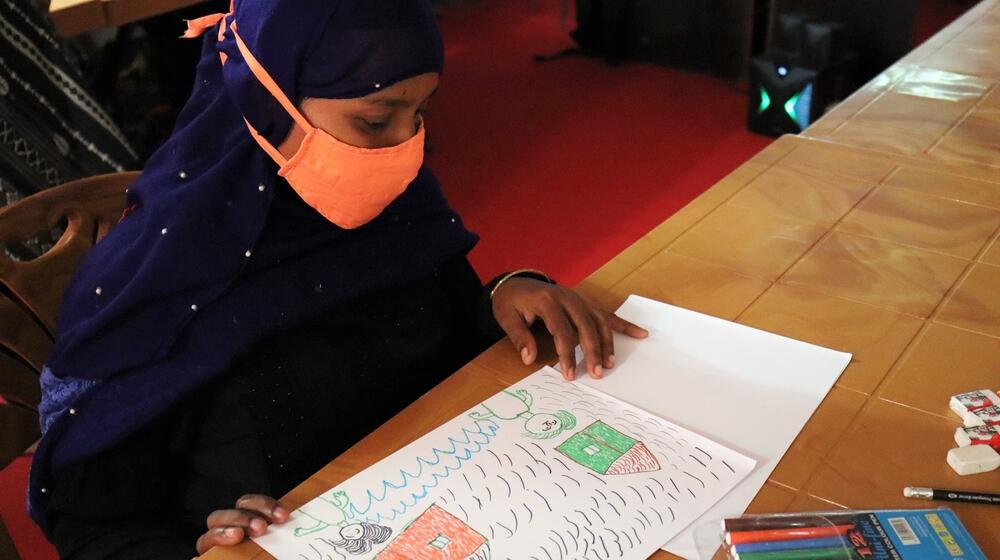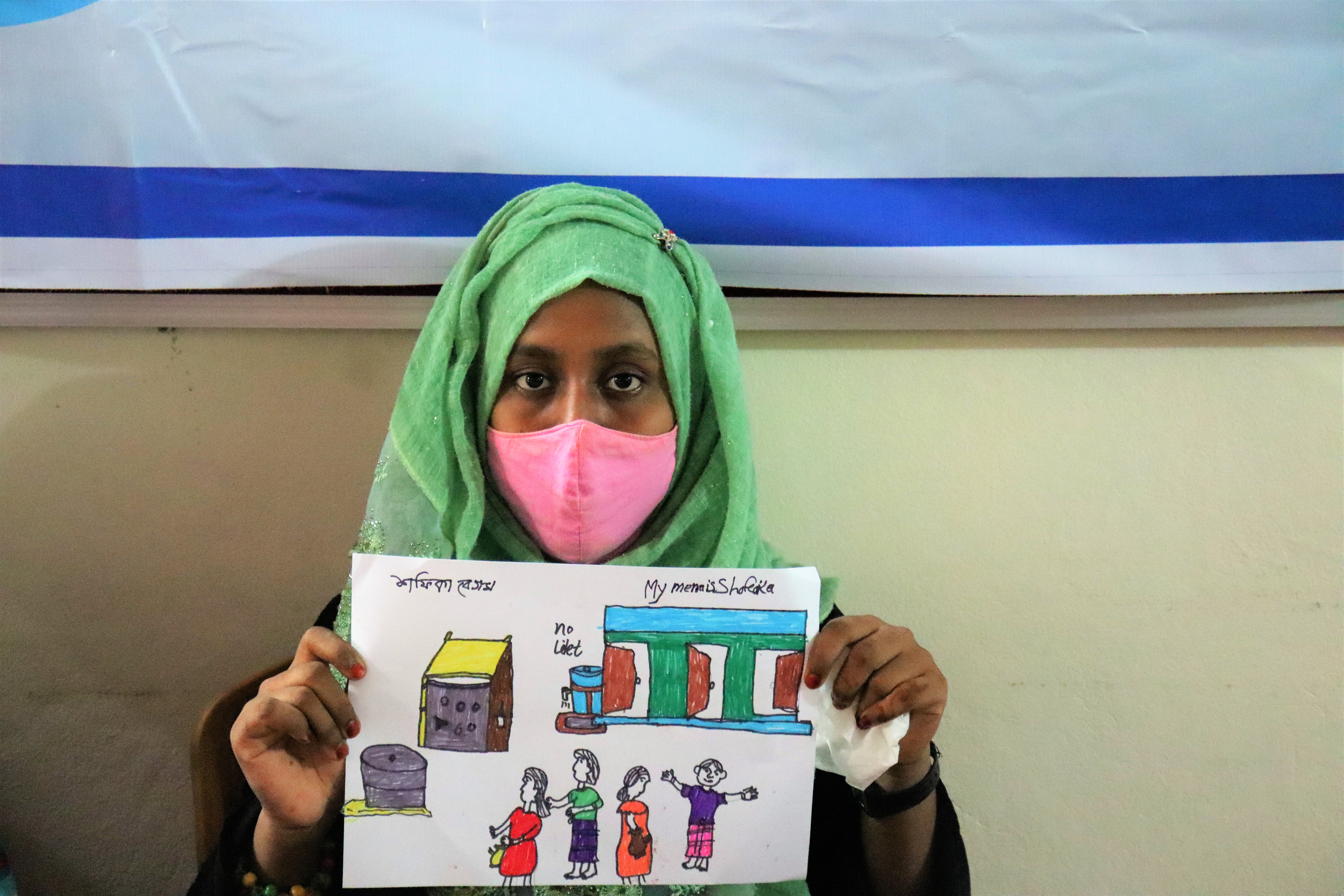"The Earth and her children are suffering, because we continue to hurt her. The Earth is also thinking about the future, about the education of her children. The Earth needs to be green, healthy and happy!”
Toslima, a Rohingya adolescent from Cox’s Bazar, cannot contain her excitement as she helps us interpret a symbolic drawing that she has just completed of suffering earth turning slowly from green to red.

Toslima made the drawing during the course of a four-session creative art workshop, which she attended in the Rohingya refugee camps in late 2021. The creative art workshops were jointly organized by ARTconnects and UNFPA under the project title “In Solidarity – The Migration Blanket”, and they aimed to engage 13 Rohingya adolescents in the discourse surrounding climate change through creative arts.
ARTconnects is a creative educational project founded by Salma Zulfiqar, which utilizes the power of art to teach girls from marginalized communities around the world about their fundamental rights. The project began during the COVID-19 pandemic with a documentary showcasing the hardships that the pandemic was causing to vulnerable women and girls around the world.
After the success of the first documentary, Salma conceived the idea for a series of online sessions uniting vulnerable women and girls from around the world in a common discourse around climate change. Through the sessions, Salma wanted to explore the impact climate change was having on women globally and celebrate the role of women in climate action, adaption, mitigation and response initiatives. Bangladesh was chosen as one of the 16 countries (Afghanistan, Bangladesh, Cameroon, Greece, India, Jordan, Kenya, Malawi, Nigeria, Pakistan, Sierra Leone, South Africa, Tanzania, Uganda, UK, Zambia) to participate in the ambitious initiative.
Salma was extremely satisfied with the way in which the Rohingya adolescents engaged with the project and impressed by the observations they made about the effects of climate change on their lives. “The young women noted how climate change is affecting hygiene levels in their community, as well as how climate change was worsening their period poverty,” she explains. Period poverty refers to a lack of access to menstrual hygiene items and facilities, and it affects over 500 million people around the world
The Head of UNFPA’s Sub-Office in Cox’s Bazar, Ms. Roselidah Raphael was also satisfied with the outcomes of the project. “Through creative skills and drawing, girls in the camps got to know what climate change is and what its impact is on their lives. The sessions also taught them how to solve problems at the local level,” she states. “Moreover, by using art, UNFPA tapped into the power of healing through psychosocial support activities. Drawing is one such activity as it allows one to express their feelings and thoughts,” she adds.
Safika Akter, one of the participants of the sessions, was particularly enthusiastic about the practical advice the sessions gave to her on taking climate action. “Thanks to this project, I realized that I can encourage my community to plant trees. If we put our effort into it, we can plant a lot of trees here. We can also raise awareness of the negative impact of deforestation by explaining the importance of oxygen, which we are collecting from trees,” she exclaims.
“For a girl, it can be challenging to fetch water in the camps. On the way to the collection point, she may face gender-based violence. Camps are overcrowded and not safe at all times of the day,” Safika describes the drawing she made in the workshop.
The spirit embodied by Safika is precisely what Salma wanted to see after completing the sessions in Bangladesh. “My dream is to see empowered women and girls with a voice and enable them to actively participate in decision-making related to climate change. The collaboration between ARTconnects and UNFPA for the Migration Blanket film project has been instrumental in reaching out to vulnerable women in Cox’s Bazar and supporting Rohingya girs through creative learning,” she concludes.
The theme of International Women’s Day this year, “Gender Equality today for a Sustainable Tomorrow”, highlights how women bear the brunt of the effects of climate change as they are more dependent on the natural resources threatened by it. By making women and girls conscious of the impact of climate change on their lives, UNFPA wants to empower a new generation of powerful female leaders, who are not afraid to raise their voices and take action against climate change. A sustainable tomorrow is not possible without the contributions of half of the world’s population.
Click here to watch the new trailer of the film “The Migration Blanket - Climate Solidarity” released on International Women's Day 2022



